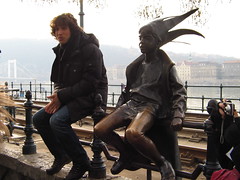According to our tour guide (on the left, below) on a walk in Budapest, the very special syntax used by Yoda from Star Wars is in fact Hungarian.
As a quick refresher, these are examples of Yoda-speak (from http://itre.cis.upenn.edu/~myl/languagelog/archives/002173.html):
Always two there are, no more.
Truly wonderful, the mind of a child is.
Much to learn, you still have.
When nine hundred years old you reach, look as good you will not.
As you can see, it’s just the order of the words that is changed from the English, and in fact some of the sentences he speaks are actually straight English. But where did the idea come from?
The story goes that George Lucas was looking for some unusual speech pattern for Yoda and had a Hungarian technician translate his English lines into Hungarian and back again, and this resulted in the particular Hungarian grammatical order. In Hungarian, this is subject-object-verb, whereas English is subject-verb-object (isn’t linguistics fascinating?).
I’ve seen Yoda-speak referred to as both Yodaese and Yodish and it has been analysed to death by amateur linguists. See a couple of illuminating sites below (none of which mention the Hungarian connection):
If anyone has any more detail on this story, I’d love to hear it!

Born in Belfast and now living in London, Julie McNamee is involved in internet marketing as a day job and blogging as a hobby. She’s interested in all things quirky and Fortean, as well as art, photography and theatre. Her blog Quirky Travel, specializes in London and Paris top tips and off the beaten path information with subjects such as London film locations and unusual Paris museums.










